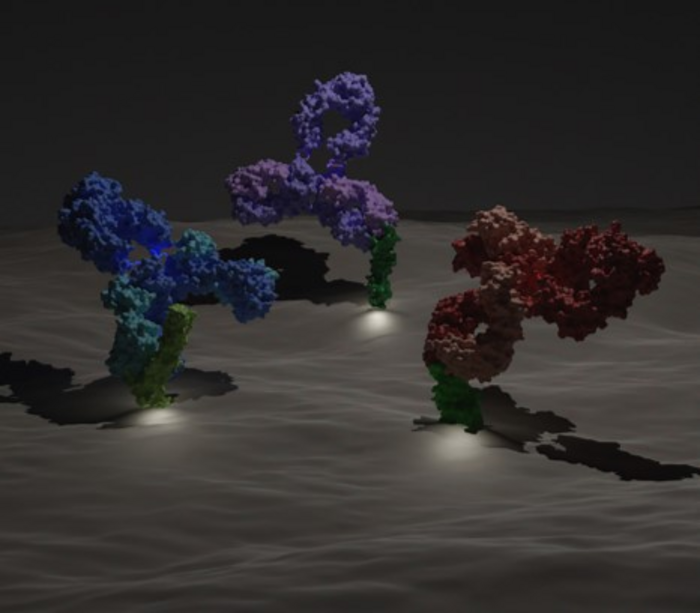Before World Cancer Day (4th February), new research from the Centre for Cancer Immunology at the University of Southampton has demonstrated that altering how firmly an antibody attaches to a target can enhance cancer treatments.
 Illustration of antibodies binding receptors and stimulating them. Image Credit: University of Southampton
Illustration of antibodies binding receptors and stimulating them. Image Credit: University of Southampton
Viruses and bacteria are identified and marked by antibodies so that the body’s immune system can eliminate them. The human immune system adjusts these antibodies to have a stronger hold on certain targets, termed as higher affinity, to aid in preventing a second infection.
A similar idea underlies immunotherapy cancer treatments; direct targeting antibodies are developed to locate and attach closely to cancer cells so that the immune system can destroy them. Although certain malignancies have responded well to these antibody therapies in recent years, many cancer patients still fail to respond or develop resistance to them.
Researchers from the University of Southampton have demonstrated in a recent study, which was published in Nature, that a specific sort of therapeutic antibody known as “immunomodulatory antibodies” is effective in treating cancer when it has a looser grip.
Affinity engineering, which alters the strength of binding, could be a more effective and adaptable way to treat cancer, according to the study team.
Immunomodulatory antibodies function by changing the signals that are delivered to the immune cells to make them more active and better at destroying cancer cells. They attach to receptors on immune cells rather than tumor cells.
In the study, the team looked at three different receptors (CD40, 4-1BB, and PD-1) and found that when the binding was looser, there was greater receptor clustering and increased signaling into the immune cells. One of these, CD40, demonstrated improved tumor cell eradication.
Although the number of approved antibody drugs is continually increasing, with over 100 now in clinic, some patients remain unresponsive to the treatment. Therefore, developing new strategies to super-charge our antibodies through techniques such as affinity engineering is key to providing better treatments for patients.”
Mark Cragg, Professor, Centre for Cancer Immunology, University of Southampton
He added, “Our study suggests that by changing the affinity we can effectively fine tune the antibody to the desired level and activity. Importantly, immunomodulatory antibodies target the same receptor on immune cells and so can in theory be used for very many different types of tumors, opening up more treatment opportunities for more people.”
“The main applications currently are in oncology, but in principle the same approach could be used for antibodies treating autoimmune disorders and inflammatory diseases,” Cragg further stated.
Dr Xiaojie Yu, study first author and now an assistant professor at the School of Life Sciences at Westlake University, stated, “High affinity binding has been the mantra of therapeutic antibody development for decades. The finding that low affinity was conducive to antibody-mediated cellular signaling by the immunomodulatory antibodies presents a powerful tool for developing new and more effective antibodies for treating cancer and autoimmunity.”
After a successful effort to raise £25 million to create the Centre, the University launched the Cancer Immunology Fund to support the critical research being conducted there. Cancer Research UK and the Cancer Immunology Fund jointly funded the study.
This exciting work is exactly what we hoped would happen when we were fundraising to build the Centre for Cancer Immunology. The many generous donors whose philanthropy contributed to the Centre, including those who funded a key piece of equipment used in these experiments, should feel great pride at the progress the Southampton team is making.”
Katherine de Retuerto, Associate Director, Development, University of Southampton
Dr Iain Foulkes, Executive Director of Research and Innovation at Cancer Research UK, added, “Cancer is a master of the art of evading the immune system. We need to try many different tactics to help our bodies unmask tumors and attack them. Immunomodulatory antibodies are one of the cornerstones of immunotherapy, which is fast becoming a staple treatment in the clinic. But immunotherapy doesn’t always work for everyone, and we need to keep refining it to ensure it gives patients the best chance of a good outcome.”
Dr Foulkes concluded, “This research offers an exciting new approach to making antibody treatments work better and in the future we hope to see it reach its full potential in the clinic.”
Source:
Journal reference:
Yu, X., et al. (2023). Reducing affinity as a strategy to boost immunomodulatory antibody agonism. Nature. doi.org/10.1038/s41586-022-05673-2